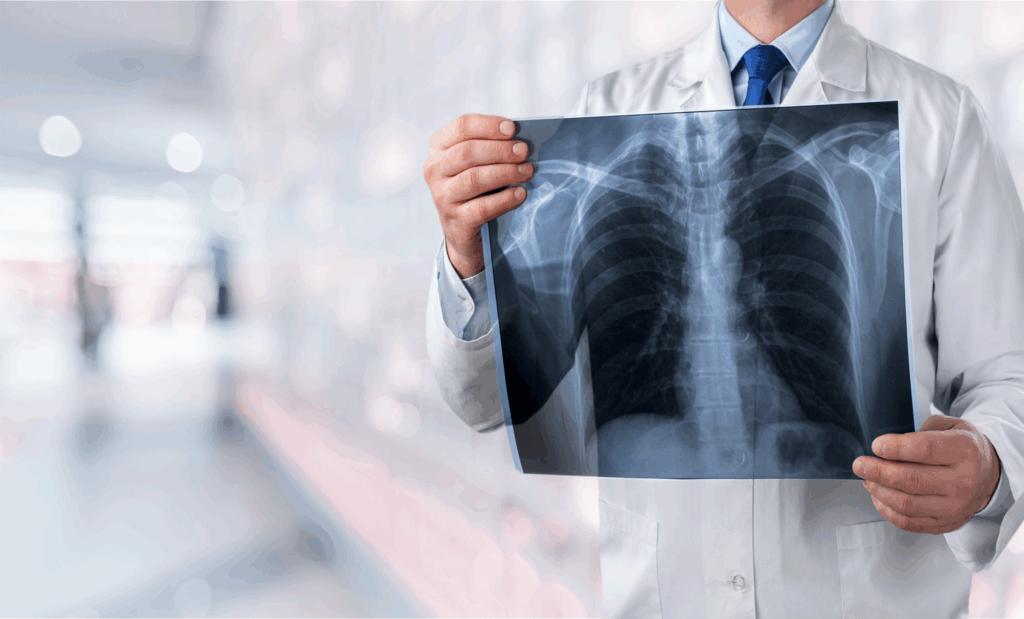Lung cancer isn’t a diagnosis reserved for smokers. There has been an increase in lung cancer cases diagnosed in people who have never smoked. While smoking is still the leading cause of the disease, 10-20% of diagnosed cases are people who have never smoked or smoked fewer than 100 cigarettes in their lifetime.
As smoking rates decline, it’s important to understand what’s driving the increase in non-smoker lung cancer cases to develop effective prevention and early detection methods.
The changing landscape of lung cancer
A 2017 study published in the Journal of the National Cancer Institute found that the incidence of lung cancer in non-smokers increased from 8% in the period between 1990 and 1995 to 14.9% in the period between 2011 and 2013.
Women who are never smokers are more commonly diagnosed with non-small cell lung cancer than men. Lung cancer in never smokers is often seen in a younger demographic as it tends to occur at a younger age than lung cancer in smokers or former smokers.
The lung cancer characteristics also tend to vary from those who are smokers. 50-60% of lung cancer found in people who never smoked are adenocarcinomas, and 10-20% are squamous cell carcinomas.
Potential causes and risk factors
The causes of the increase in never-smoker lung cancer diagnoses are unclear. However, there are risk factors that could contribute. Radon exposure is an environmental factor that is often cited as the leading cause of non-small cell lung cancer in never smokers. Radon is an odorless, colorless gas released from the natural breakdown of uranium in the soil.
Air pollution is another environmental factor that can contribute to non-smoker lung cancer. The risk varies by geography but overall accounts for about 8% of lung cancers in never smokers.
Occupational exposures account for 13-29% of lung cancers in men who have never smoked. These occupational hazards include asbestos, diesel exhaust and other chemicals.
A person’s family history may influence their chances of developing lung cancer, especially if a close relative was diagnosed before turning 50. For nonsmokers, lung cancer is often linked to particular genetic mutations, like EGFR, ALK and ROS1. These mutations appear in about 75% of cases among nonsmokers, compared to 15-20% among smokers. These genetic distinctions can affect how individuals respond to treatment, with nonsmokers often having better outcomes from targeted therapies.
It’s estimated that about 7,300 cases annually are attributed to secondhand smoke exposure in nonsmoking lung cancer cases.
Even with these risk factors, there is no apparent cause for many lung cancers in never smokers.
Challenges in diagnosis and treatment
There can be a stigma associated with lung cancer. The misconception that it is a smoker’s disease can lead to delayed diagnosis and treatment. Part of this delay is due to the lack of screening recommendations for non-smokers. There is no recommended lung cancer screening for people who have never smoked. The potential harm of the screening is thought to outweigh the possible benefit of finding lung cancer early. Screening guidelines are primarily focused on current and former heavy smokers. Due to the lack of screening, never smokers are often diagnosed at later stages when the disease is more advanced and more challenging to treat.
The characteristics of never-smoker lung cancer are unique. The distinct features can present unique challenges for treatment. Biomarkers such as EGFR or ALK mutations are more common in non-smokers. 50-60% of lung cancers in never smokers are adenocarcinomas, which are more likely to have these targetable mutations. These mutations can make tumors more responsive to treatment.
If you have a family history of lung cancer, or have concerns about your lung health, talk with your doctor to learn about your options for lung cancer screenings.
Cancer Care
Discover more about Cancer Care, including locations and providers, at Mount Nittany Health



